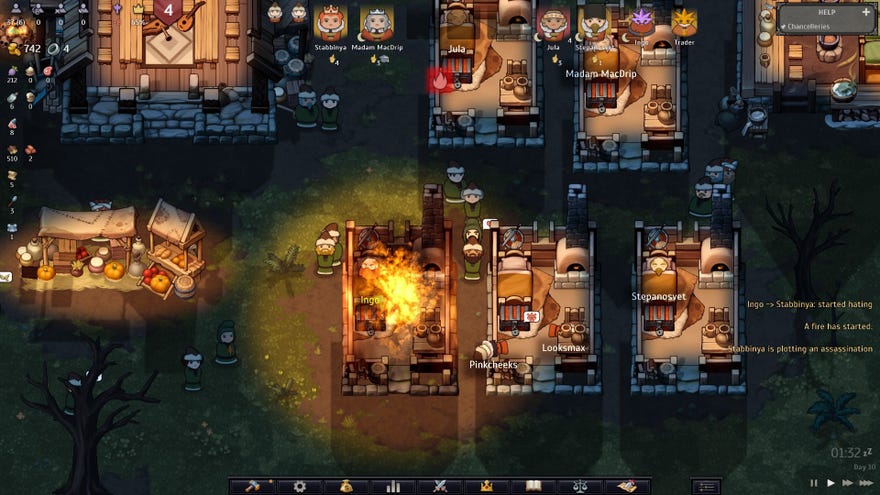I set a bishop on fire in Norland and the sicko loved every second of it
Just a little sin
I am burning the Bishop while he sleeps. I'd say it's nothing personal, but quite a lot in medieval management sim Norland is personal. He shouldn't have slept with the Queen's sister, for example. He shouldn't have insisted his lover subsequently pay him for a confession to absolve herself of the guilt accrued from sleeping with him. He shouldn't have felt safe in a room next to the Queen, a woman described as "reckless" in her character traits, and who is perilously close to having a nervous breakdown. This, my holy friend, is how your bed chamber becomes a raging inferno.
By the end of my first game of Norland, the village of Nandos (you can name your own settlements) is covered in more blood than the back end of the bard's best work. In storytelling terms, it is a tragedy. In terms of fantasy management games? It is great fun. The failure cascade as waterslide.
My test for likening a game to Dwarf Fortress or Rimworld is whether the little dramas that unfold are funny. Are they laced with enough unexpectedness and bitter rivalry to constitute a story generator? Or are they at least a funny anecdote generator? Some management games can simulate a compelling tale of conflict yet feel, at their core, a restricted machine (hi Frostpunk) while others can offer a lot of moving parts but be quite empty of conflict or humour (hi Clanfolk). Norland pushes you into a deep pool of fuck-ups and shortages with the smug enthusiasm of a sim containing enough gears and cogs to crack a hundred nuts. I laughed a lot.
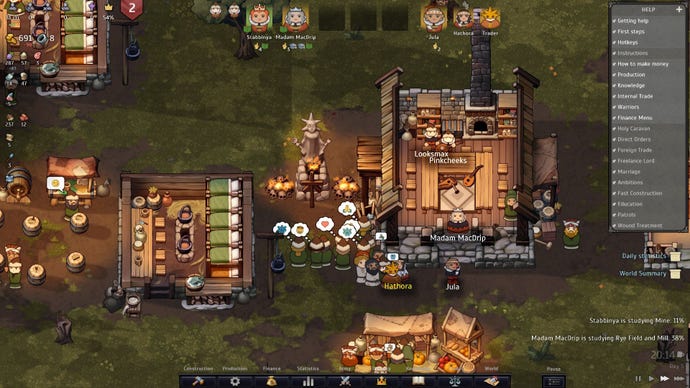
Here you're asked not only to build new structures - flour mills, rutabaga farms, iron mines - but also to assign a Lord to each building to oversee and give instruction to all the peasants working in that building. These Lords are basically your major cast of characters, each with their own traits, skills, likes, dislikes, and attitudes towards others. If Rimworld is the first big touchstone, then Crusader Kings is the second. You can ask Lords to spend time with one another, go hunting together, duel, play dice, and so on, all in some effort to resolve disputes or improve relationships.
Outside of your own settlement, a larger world map shows other towns with their own Lords, all of which you can trade with or become allied to through marriage. (Yes, you can also conquer them with a bloody fist, calm down.) There are a lot more options involving intrigue and politicking, and here too the royal garb of Paradox's monarchy sim drags itself across Norland's shining floor. Even the dark cool palette of the menu boxes, and the painterly loading screens remind me of good times imprisoning the children of rival kings. The map evolves too. In my game, what started as a hodgepodge of states would become a landscape half-dominated by a single alliance, with cheeky Nandos sadly bleeding in the corner. Perhaps I should not have spent so long min-maxing my Lords to be the most off-kilter family of the (fantasy) middle ages.
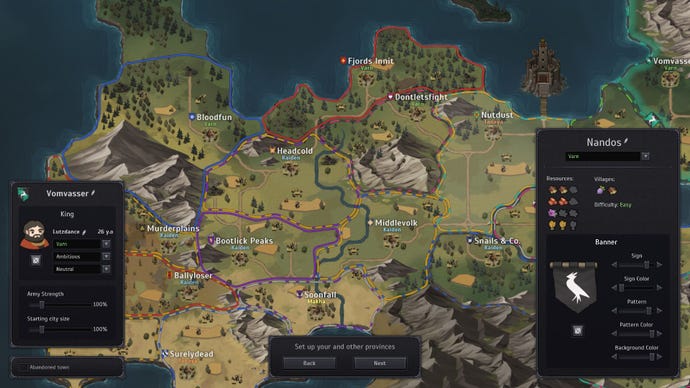
You see, the Lord creation at the beginning of a game lets you tweak stats and personality quirks. You can rename lots of characters and towns too (something I always appreciate in a management sim like this). My noble family would consist of two sisters bringing up a baby boy, whose parents are nowhere to be found. My Queen is called "Stabbinya". She is the reckless and militant caretaker of the improbably polite boy, Pinkcheeks. On paper she'll be good at commanding armies, leading troops, and fighting. In practice, we don't get that far. Her sister, "Madam MacDrip", is an intelligent, pedagogically gifted overseer. She has terrible manners.
I spent a similarly long time just naming the provinces and neighbouring kings before the game even kicked off. And I think this is where I understood Norland had some claws. It wasn't long before I was in the thick of town management, staring down at five peasants sleeping rough in the streets, with a bunch more wandering around the fields in the morning looking clueless because the Lord who was supposed to give them instructions was too busy teaching management to a toddler.
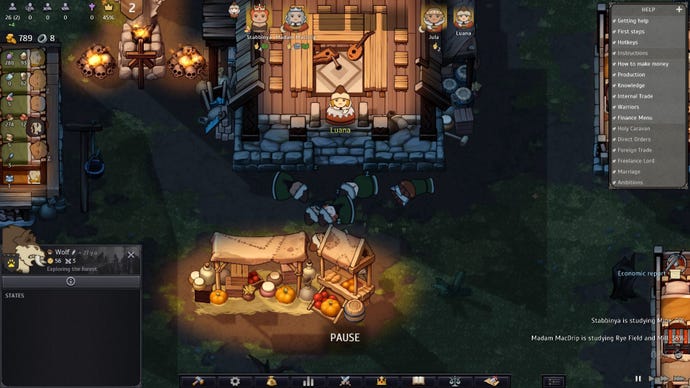
Progress is quite slow (helped a little by some obligatory fast-forward buttons). Every few days a holy caravan visits and it sells a much-needed commodity - books. To make new buildings or improvements possible, you have to own a book about that topic, then assign a Lord to read that book and slurp up all the knowledge. Some books you can buy include: "Intimidation Of Tramps", "Fertilize Correctly", and "How To Deal With Addiction". Once one of your bigwigs has learned a piece of knowledge, the whole community will benefit. A new hop field, for example, or the basic understanding required to cook meat properly. But, the game warns me, if that knowledge-holder dies, and nobody else knows how to do that thing, then the ability to enjoy these things vanishes. Aha, the disaster machine is all coming together now, isn't it?
In the end, this is not how my personal disaster unfolds. That begins when the outsiders arrive...
First, a landless Lord called Jula arrives. This is useful, because you can hire these characters as temporary Lords for some costly silver rings. That means more help to tell the peasants what to do. When I hire Jula, I do not know that she completely and utterly loathes the Queen. All I know is that she's intelligent and can run a good brewery. As a result, Jula will never really make Nandos feel like her own home. There is a way to convince freelance Lords like this to stay, to grant them a title and offer them a permanent place in your weird-ass family. But not Jula. She works for us, but make no mistake - she hates us. The only person Jula hates more than the Queen is the Queen's new baby, who is inexplicably born one day, fully clothed and walking, in her highness' bedroom. Ah, little baby Looksmaxx. Remember him. He will die horribly.
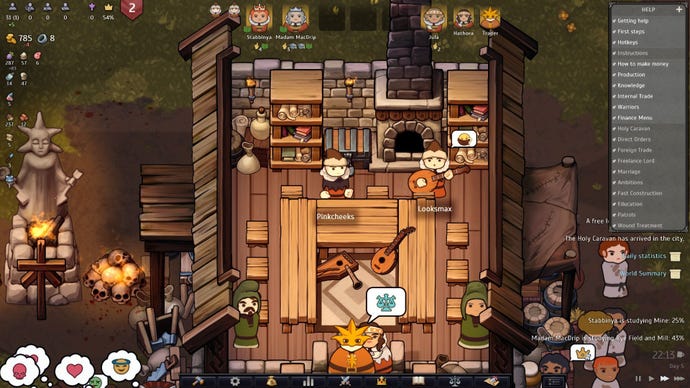
The next visitors to upend the natural order (what little natural order we have established in Nandos) are quick to follow. King No Nose of Pringleton is coming to visit. I can even see him as he trundles towards the settlement on the world map. We are pleased to receive him, because I want to improve my relationship with his kingdom, enough to set up a long-term trade agreement to offload my overabundant stocks of rutabagas in exchange for something better. He actually seems lovely. Unfortunately, he arrives alongside a companion. A Bishop called Ingo, who triggers some tutorials about the mood-destroying effects of sin. Mood is important in Norland. If your Lords get too depressed, overworked, or annoyed, they will refuse to perform their overseeing tasks, and the peasants will take the chance to chill out. So if the guilt from sinning can wreck a characters mood, it is indeed a thing to be wary of.
But don't worry, the church informs me, you can confess to the Bishop and relieve this spiritual pain. That sounds wonderful. Sin is clearly to be avoided, and his holiness blesses us with his mere presence. We offer the Bishop a room in one of our unoccupied lordly houses. Piety is important to the people of Nandos. We are a holy and modest people.
In the next room Jula is fucking a rutabaga farmer called Oisin.
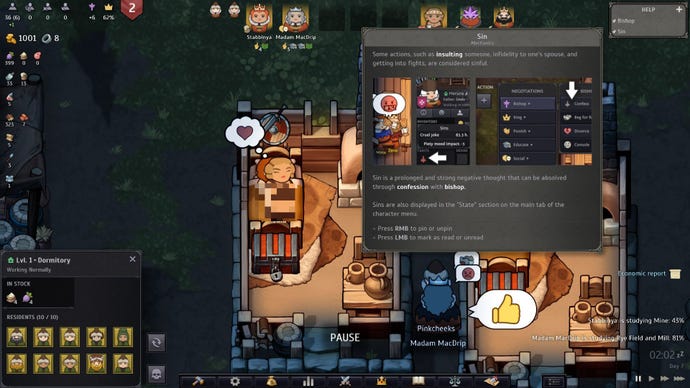
She pays him when he leaves. For a minute I think this will not bode well. I mouse away for a moment. What will the bishop think? I hope he hasn't notic--
But the Bishop is in Madam MacDrip's room. They are also having sex.
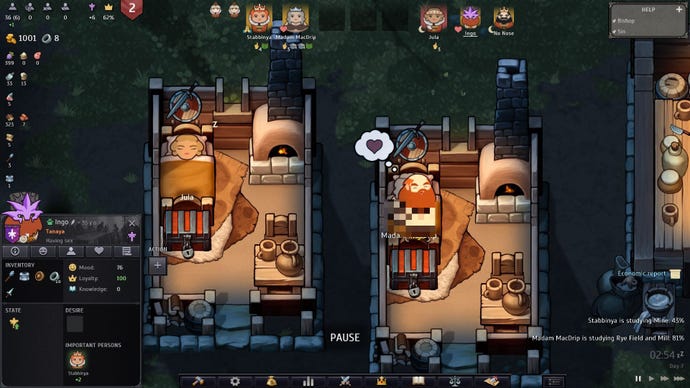
The good news is that King No Nose has slept through the entire horny fiasco. The bad news is that Madam MacDrip is so overcome with sinful guilt the next morning that she refuses to work until she can absolve herself. Of course, the way to achieve absolution is to confess her sin to the same Bishop she was riding last night. That's when I find out the cost of this ritual: six silver rings.
I see now what is happening. Who would have thought the church could be so conniving?
I refuse to let Madam MacDrip confess. Everything that happens afterwards is disaster upon disaster. More kings from distant lands visit, but I don't have the housing to accommodate them, which humiliates my nation. One of the visitors starts insulting Jula, forcing her into a deep depression. The others, wracked with false guilt and stretched thin across field and lumberyard, also become moody. A "fleshwolf" attacks a stray peasant in the woods and then wanders into the library, its mouth bloody and examining baby Pinkcheeks like a pudding it doesn't want right now, but will happily enjoy later.
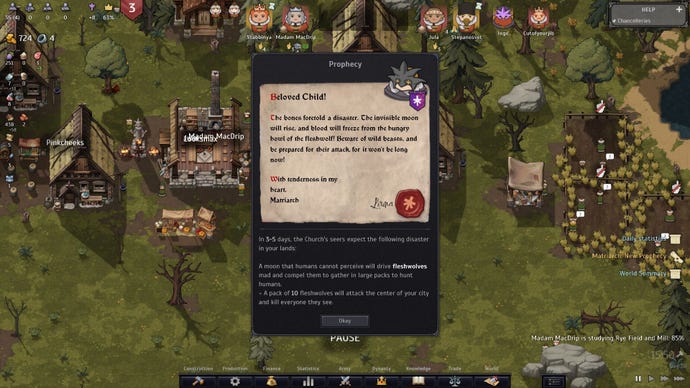
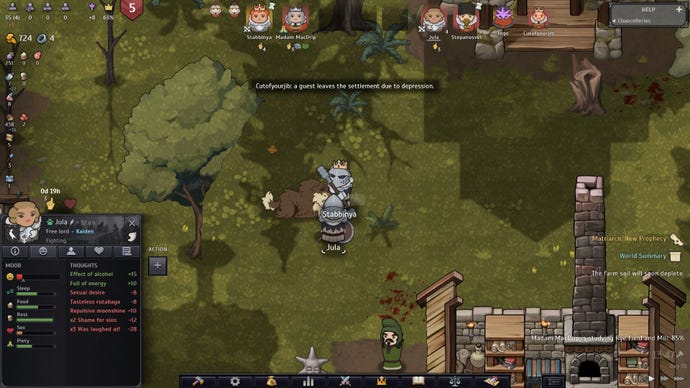
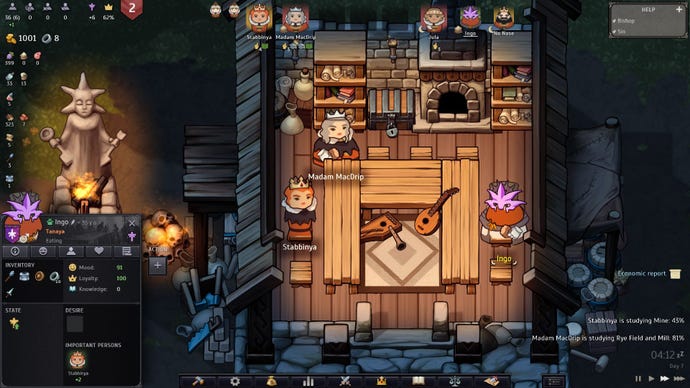
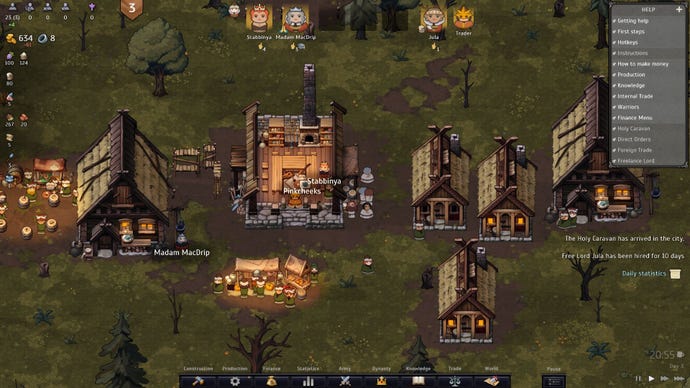
I put together a hunting team, Jula and Queen Stabbinya, in an effort to purge nearby wolves and maybe even improve their relationship (hunts can result in "deep" conversations between characters) but scarcely have they donned their armour than they break into a physical fight between themselves. Meanwhile, Baby Looksmax and Pinkcheeks are having some kind of lute-playing contest and, judging by the emoji-like icons appearing in their speech bubbles (skulls, biohazard symbols, medicine bottles) I can only conclude that they are discussing what it means to die. They are five years old.
The soil grows fallow. The rutabagas go untended. The mine we spent so long researching goes unused. And in the chirps of the dawn chorus, a prophecy arrives - a little pop-up note from the church that says: get ready, your town will someday soon be attacked by a pack of eleven wolves.
I dismiss the letter with grim cynicism and look at the Bishop who still hasn't left our town, is still abusing our hospitality, drinking our moonshine and eating our vegetables while doing nothing useful. He fills one of our manor houses with his stench every night. I've had a good time with Norland so far. I gained far more laughter from it than other Rimworld competitors in any case. And I haven't even got truly stuck into the inter-city trading or the marriage proposals, the alliance making or the war-mongering (one downside about the game is that it will take some time to learn). But if I am going to get into all that, it won't be from the god forsaken town of Nandos. Let the wolves come, I decide. One last time I examine Ingo, the clerical bed pest and sextortionist in purple robes, as he meanders smugly around town. And I remember something else the game lets you do. I set a task for one of the lords: Attempt to Kill the Bishop.
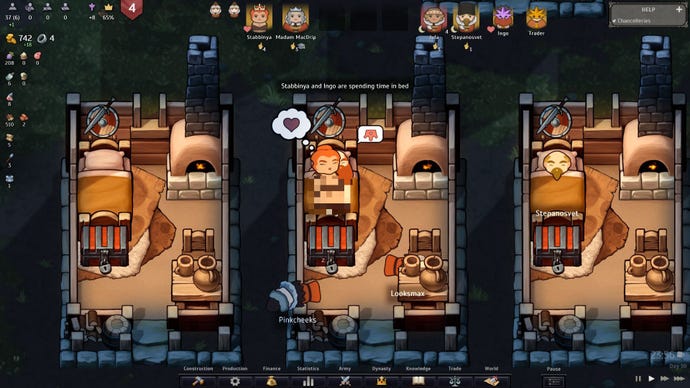
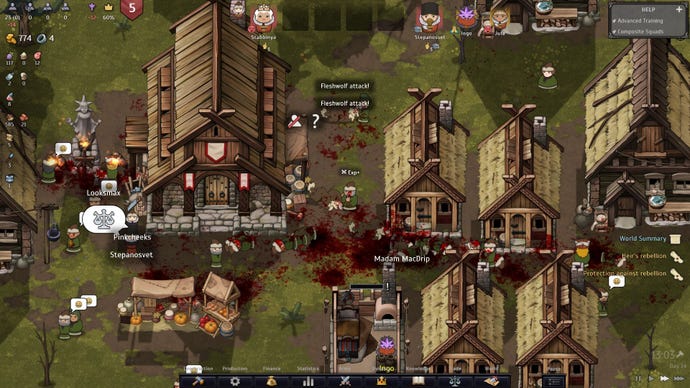
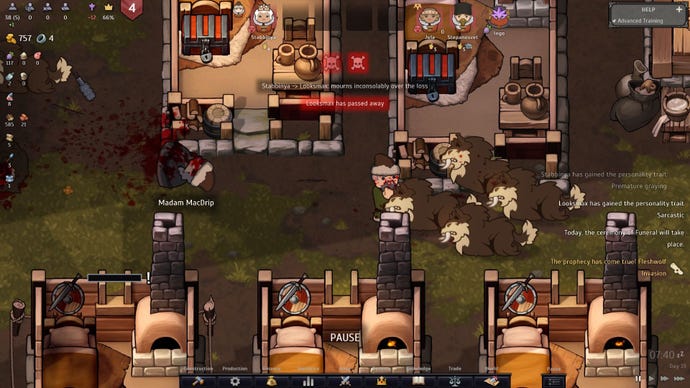
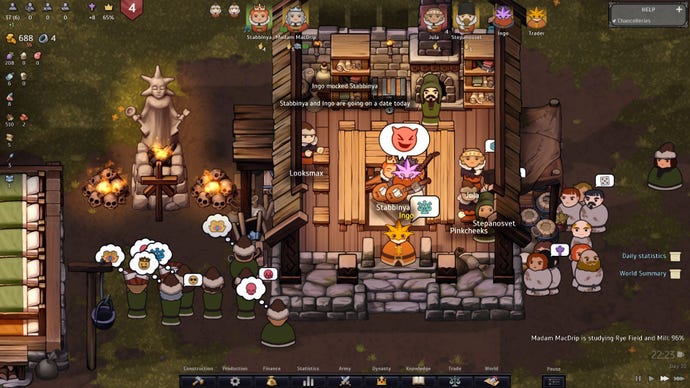
That night, Queen Stabbinya brought him to the hall, got him drunk, played music with him in front of the whole town and made angel face emojis at him as she walked him back to her chambers, where again they did what Bishops are wont to do. As he stumbled back into his own room at one in the morning, the Queen quietly rose and followed at some distance. As he fell asleep, she stood outside his door, and lit his entire building on fire. And - this is the damnedest thing - he survived. He ran from the building, fully immolated, only to be stamped out by the feet of a dozen panicking peasants. Not only did he fail to succumb to the burns from this terrible ordeal. He liked it. Inspecting the Bishop, I found he gets a mood boost from "religious enjoyment of injuries". Of course he does. Of course.
When the wolves of prophecy approached shortly afterwards, I did nothing to stop them. This place was cursed. Baby Looksmaxx suffered a gruesome death in the jaws of three slavering beasts. What of it? Madam MacDrip was likewise eaten. I'm glad. Norland, still in early access, might not be as deep or fleshed-out as its sci-fi stablemate Rimworld, but it still feels surprisingly complex and varied. And it still delivers funny anecdotes. By the time the sun set on my settlement's last day, the main street was covered in blood, and the peasants were dragging every corpse they could to the pyre next to the village altar. The only injustice? That Bishop Ingo was not among them.
